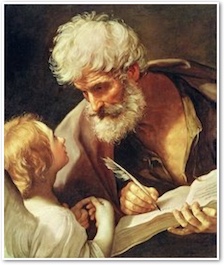Matthew (Levi) the Tax Collector
- JOHN JANARO
As Jesus passed on from there, he saw a man named Matthew sitting at the customs post.
 He said to him, "Follow me." And he got up and followed him (Mt 9:9).
He said to him, "Follow me." And he got up and followed him (Mt 9:9).
This "great conversion story" from Matthew's own Gospel is presented in similar words in Mk 2:14 and Lk 5:27 (except they give "Levi" as his name, but clearly it was the same man). Notwithstanding their brevity, these references to Matthew's vocation are presented in a way that reveals the depths of his conversion.
The first thing that is clear is that Matthew was a public sinner in the judgment of his own people. He was an official within the complicated and corrupt bureaucracy that the Roman Empire had imposed upon Galilee by means of the "client state" of the tetrarch Herod Antipas. He was a representative of Roman imperial power, and he wielded this power in Capernaum on behalf of a puppet king installed by this foreign government. He also used it to his own advantage.
Why would anyone in Israel want to be a tax collector? The compensation for being ritually cut off and generally hated by the people was the accumulation of significant wealth. Matthew was officially responsible for providing the government with a fixed sum of money periodically from his region. In order to acquire this sum, however, he was free to set his own tax fees, collecting as much as he could get from the people. The tax collector's position was virtually defined as the opportunity to practice unlimited graft and extortion. Above and beyond the required government sum and a fair wage for his own efforts, the tax collector used the force at his disposal to rob the population and enrich himself.
Matthew was, in fact, a thief and a criminal.
Then Jesus saw him. Jesus looked at the Mafia boss of Capernaum, who was in his "business office" (so to speak) doing his sordid work of squeezing people for money and keeping records of these "transactions." A tax collector in Galilee (unlike the fishermen who followed Jesus) would have been literate in both Aramaic and Greek.
Jesus saw Matthew, the person, and loved that person. No doubt he also perceived that after Matthew ceased keeping records of his own extortion racket, he could begin an altogether different sort of record keeping. He could record the words and deeds of the Teacher in writing, and see that they were passed on.
Jesus saw Matthew and spoke to him: Follow me. Matthew had probably heard of Jesus from the people, and may have even watched his ministry. Before this moment, however, he had not conceived any hope that his life could be different.
The encounter with Jesus in this moment changed everything.
Matthew's response was simple but had rich implications. Our text says he got up and followed. The Greek term used here, however, is the same word used to express Jesus' "rising" from the dead. The power of Jesus' gaze and his words had a miraculous effect, achieving something even more amazing than when he later "raised" Lazarus from the tomb. Jesus "raised" Matthew from the deeper deadness of sin, and invited him to become his companion. So also Jesus looks upon each one of us, and calls us to do the same.
 This is Meaghen Gonzalez, Editor of CERC. I hope you appreciated this piece. We curate these articles especially for believers like you.
This is Meaghen Gonzalez, Editor of CERC. I hope you appreciated this piece. We curate these articles especially for believers like you.
Please show your appreciation by making a $3 donation. CERC is entirely reader supported.

Acknowledgement
 John Janaro "Matthew (Levi) the Tax Collector." Magnificat (January, 2019).
John Janaro "Matthew (Levi) the Tax Collector." Magnificat (January, 2019).
Reprinted with permission of Magnificat.
The Author

 John Janaro is Associate Professor Emeritus of Theology at Christendom College. He is a Catholic theologian, and a writer, researcher, and lecturer on issues in religion and culture. He is the author of Never Give Up: My Life and God's Mercy and The Created Person and the Mystery of God: The Significance of Religion in Human Life. He is married to Eileen Janaro and has five children.
John Janaro is Associate Professor Emeritus of Theology at Christendom College. He is a Catholic theologian, and a writer, researcher, and lecturer on issues in religion and culture. He is the author of Never Give Up: My Life and God's Mercy and The Created Person and the Mystery of God: The Significance of Religion in Human Life. He is married to Eileen Janaro and has five children.




